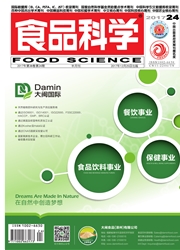

 中文摘要:
中文摘要:
为了探究市售豆芽携带细菌种类,寻求有效的杀菌方法,采用16SrRNA基因序列分析对分离的细菌进行种属鉴定,并考察了不同pH值的酸性电解水对豆芽的杀菌效果。结果表明,分离出的5株细菌分别为Kosakonia、Staphylococcus、Klebsiella、Enterobacter和Enterobacter属成员。pH值为3.02、4.47和5.58,有效氯质量浓度为46.00mg/L左右的酸性电解水处理市售新鲜豆芽,可以显著降低其微生物数量。pH4.47、有效氯质量浓度为46.09mg/L的酸性电解水处理黄豆芽,使其细菌总数、酵母菌和霉菌菌落总数、大肠菌群菌落数分别降低了1.14、2.48、1.29(lg(CFU/g)),该指标的酸性电解水处理绿豆芽,使其细菌菌落总数、酵母菌和霉菌菌落总数、大肠菌群菌落数分别降低1.23、1.42、1.25(lg(CFU/g))。因而酸性电解水对于提高市售豆芽的食用安全性可以发挥积极的作用。
 英文摘要:
英文摘要:
The bacterial species on commercial bean sprouts were identified by16S rRNA gene sequence analysis,and the efficacy of acidic electrolyzed water(AEW)with different pH values in killing bacteria,yeast and mold on commercial bean sprouts was evaluated.The results showed that5bacterial strains were isolated,belonging to the genera of Kosakonia,Staphylococcus,Klebsiella,Enterobacter and Enterobacter,respectively.AEW with available chlorine concentration of46.00mg/L and pH values of3.02,4.47and5.58could significantly decrease microbial counts on commercially available fresh bean sprouts.AEW with pH4.47and available chlorine concentration of46.09mg/L could decrease the total bacterial count,mould and yeast count and coliform count by1.14,2.48and1.29(lg(CFU/g))on soybean sprouts and by1.23,1.42and1.25(lg(CFU/g))on mung bean sprouts,respectively.AEW could play an active role in improving the safety of commercial bean sprouts for consumption.
 同期刊论文项目
同期刊论文项目
 同项目期刊论文
同项目期刊论文
 期刊信息
期刊信息
